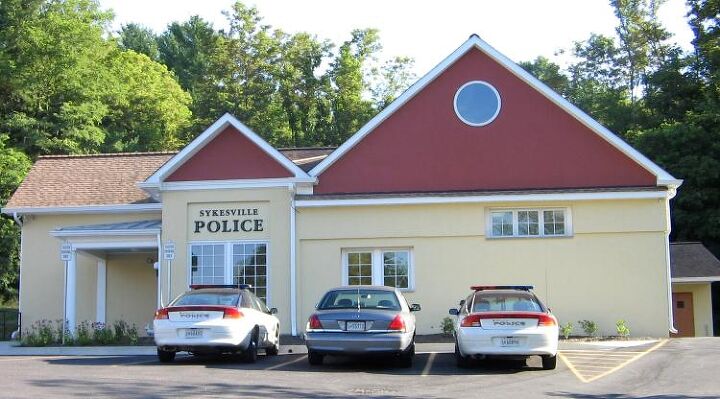Maryland: Town Residents Vote To Ban Speed Cameras
Sykesville, Maryland yesterday became the tenth jurisdiction to reject the use of photo enforcement by referendum. The town was to be the first in Carroll County to operate automated ticketing machines after leaders approved an ordinance designating three speed camera zones on February 22. These plans fell through after a group of residents collected more than enough signatures within the thirty-day deadline to put an ordinance repeal on the ballot. Sixty-one percent of Sykesville voters insisted on repealing the use of speed cameras.
The results are directly contrary to polling data released by the Insurance Institute for Highway Safety. In a 2008 report on the nearby Montgomery County speed camera program, the insurance company-backed group claimed sixty-two percent of residents supported the use of automated ticketing machines. The institute has a significant financial interest in the issue as states like Arizona, California and Illinois apply license points to certain types of photo tickets. A similar incentive drove town officials to spend taxpayer money in an attempt to convince voters to keep the cameras.
“We have received a number of emails and phone calls from residents who have expressed concern about outside special interest groups that have knocked on your door gathering signatures on a petition to oppose the adopted ordinance,” Mayor Michael P. Miller wrote in a taxpayer-funded letter to all residents before the vote. “Some of you have indicated that they were spreading misinformation about several issues including the town’s rationale and intent for adopting the ordinance to allow photo enforcement.”
The petitions, in fact, were circulated by a group of Sykesville residents led by Chris Martin. Similar citizen-led efforts have succeeded in every test at the ballot box. Last year, eighty-six percent of Sulphur, Louisiana rejected speed cameras; 72 percent said no in Chillicothe, Ohio; Heath, Ohio and College Station, Texas also rejected cameras. In 2008, residents in Cincinnati, Ohio rejected red light cameras. Seventy-six percent of Steubenville, Ohio voters rejected photo radar in 2006. In the mid-1990s, speed cameras lost by a two-to-one margin in Peoria, Arizona and Batavia, Illinois. In 1997, voters in Anchorage, Alaska banned cameras even after the local authorities had removed them. In 2003, 64 percent of voters in Arlington, Texas voted down “traffic management cameras” that opponents at the time said could be converted into ticketing cameras.
[Courtesy: Thenewspaper.com]
More by Edward Niedermeyer
Latest Car Reviews
Read moreLatest Product Reviews
Read moreRecent Comments
- Probert They already have hybrids, but these won't ever be them as they are built on the modular E-GMP skateboard.
- Justin You guys still looking for that sportbak? I just saw one on the Facebook marketplace in Arizona
- 28-Cars-Later I cannot remember what happens now, but there are whiteblocks in this period which develop a "tick" like sound which indicates they are toast (maybe head gasket?). Ten or so years ago I looked at an '03 or '04 S60 (I forget why) and I brought my Volvo indy along to tell me if it was worth my time - it ticked and that's when I learned this. This XC90 is probably worth about $300 as it sits, not kidding, and it will cost you conservatively $2500 for an engine swap (all the ones I see on car-part.com have north of 130K miles starting at $1,100 and that's not including freight to a shop, shop labor, other internals to do such as timing belt while engine out etc).
- 28-Cars-Later Ford reported it lost $132,000 for each of its 10,000 electric vehicles sold in the first quarter of 2024, according to CNN. The sales were down 20 percent from the first quarter of 2023 and would “drag down earnings for the company overall.”The losses include “hundreds of millions being spent on research and development of the next generation of EVs for Ford. Those investments are years away from paying off.” [if they ever are recouped] Ford is the only major carmaker breaking out EV numbers by themselves. But other marques likely suffer similar losses. https://www.zerohedge.com/political/fords-120000-loss-vehicle-shows-california-ev-goals-are-impossible Given these facts, how did Tesla ever produce anything in volume let alone profit?
- AZFelix Let's forego all of this dilly-dallying with autonomous cars and cut right to the chase and the only real solution.


































Comments
Join the conversation
Glad to see the record still stands. The idea that photo enforcement can't stand up to a ballot initiative will hopefully act as a deterrent to other municipalities considering it. In this case, the town's mayor outright lied to his constituents, and 61% still voted against it.
Welcome to the only town in the country dumb enough to buy not one, but two Dodge Intrepid police interceptors.